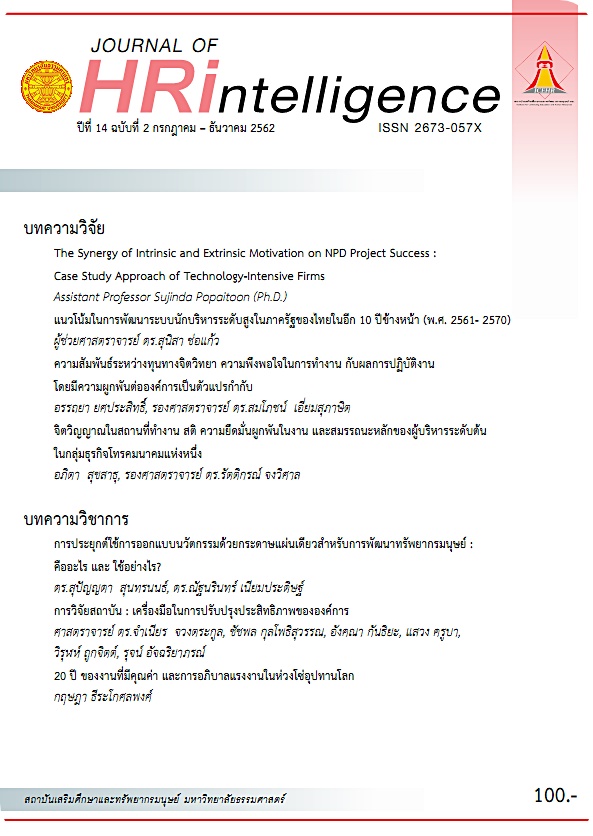Ten-Year Trends in the Thai Senior Executive Service (from 2018 to 2027)
Main Article Content
Abstract
This article aims to illustrate the next ten year trends (2018-2017) of the Senior Executive Service (SES) in the Thai public sector by employing the EDFR (Ethnographic Delphi Future Research) technique from 18 experts of the field. The research found that entering to the senior executive position is expected to be a hybrid-based system. The senior executive must be qualified by the development program and must pass the competency assessment process. For the selection and appointment process of the senior level 9 and level 10, there should be an establishment of a central agency playing a role of criteria setting, and a permanent secretary should be responsible for an appointment process. Meanwhile, the appointment of the senior executive level 11 should be processed by a committee and appointed by and a minister. The senior executive development program is expected to be arranged by both central and government agencies. It should be a competency-based, boundaryless by using technology, opened for idea exchange, and action learning. The performance review process is expected to be more completed and the performance review board is needed. The principle for compensation is still the same process as it has been done currently. The research suggests that the Thai government should develop a hybrid-based SES and all of the processes in the SES should be driven by the one stop service supervised by the central agency. But the government agencies will be decentralized in form of joint-action in an operation process.
Article Details
ขอมอบลิขสิทธิ์บทความที่ได้รับการตีพิมพ์ให้แก่สถาบันเสริมศึกษาและทรัพยากรมนุษย์ กรณีมีการฟ้องร้องเรื่องการละเมิดลิขสิทธิ์เกี่ยวกับภาพ กราฟ ข้อความส่วนใดส่วนหนึ่ง และ/หรือข้อคิดเห็นที่ปรากฎในบทความ ให้เป็นความรับผิดชอบของข้าพเจ้าและผู้เขียนร่วมแต่เพียงผู้เดียว
References
Kuperus, H. and Rode, A. (2008). Top Public Managers in Europe: Management and Working Conditions of the Senior Civil Servants in the European Union Member States (Study Commissioned by the French EU-Presidency), Maastricht, European Institute of Public Administration.
Lafuente, M., Manning, N., and Watkins, J. (2012). International Experiences with Senior Executive Service Cadres. Retrieved October 10, 2017 from http://siteresources.worldbank.org/EXTGOVANTICORR/Resources/3035863-1285601351606/GET_Note_Recently_Asked_Questions_Senior_Executive_Services.pdf.
Moon, M. J. and Hwang, C. (2013). The State of Civil Service Systems in the Asia-Pacific Region: A Comparative Perspective. Review of Public Personnel Administration, 33(2): 134-148.
Phakthanakul, T. and Chieocharnpraphan, T. (2016). From Open Data to Open Government: Public Administration Innovation in the Digital Era. Eighteenth Annual King Prajadhipok Institute (KPI) Congress 2016. Bangkok. King Prajadhipok Institute.
Thailand - Civil Service Act B.E. 2551. (2008). Royal Thai Government Gazette (January 25, 2008).
The Office of the Civil Service Commission. (2018). Performance Appraisal for Senior Civil Service. Retrieved October 10, 2018, from https://www.ocsc.go.th/th/blog/2018/08/.
The Office of the Civil Service Commission. (2017). Job Specification for the Senior Civil Service. Retrieved March 4, 2018, from http://www.ocsc.go.th/sites/default/files/attachment/job_specification/1_1_001_1_new.pdf และhttp://www.ocsc.go.th/sites/default/files/attachment/job_specification/1-1-001-2_rev03.pdf.
The Office of the Civil Service Commission. (2016). Performance Appraisal for Senior Civil Service: A Guide for Assessor. Retrieved October 12, 2018, from https://www.ocsc.go.th/sites/default/files/attachment/article/manual_guide_executive_.pdf.
The Office of the Civil Service Commission. (2012). Compensation Guidelines for the Civil Servant. Bangkok. The Office of the Civil Service Commission.
The Office of the Civil Service Commission. (2009). Performance Evaluation Guidelines for the Public Sector: Performance Management and Performance Appraisal. Nonthaburi: P.A. Living.
The Office of the Civil Service Commission. (2001). Core Competency for the Senior Civil Service. Retrieved March 25, 2018, from http://www.ocsc.go.th/sites/default/files/attachment/article/07_phaakhphnwk_ch_smrrthnathaangkaarbrihaar.pdf.


